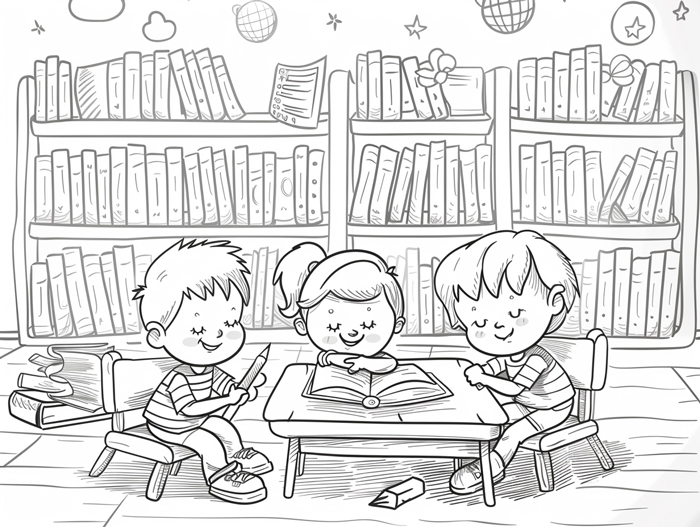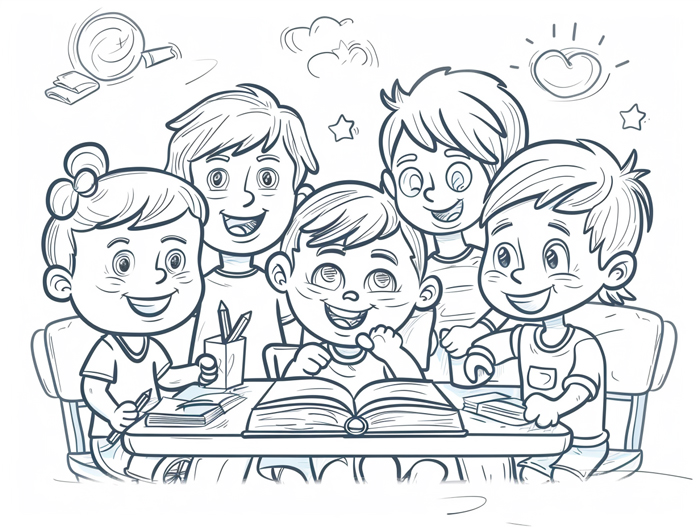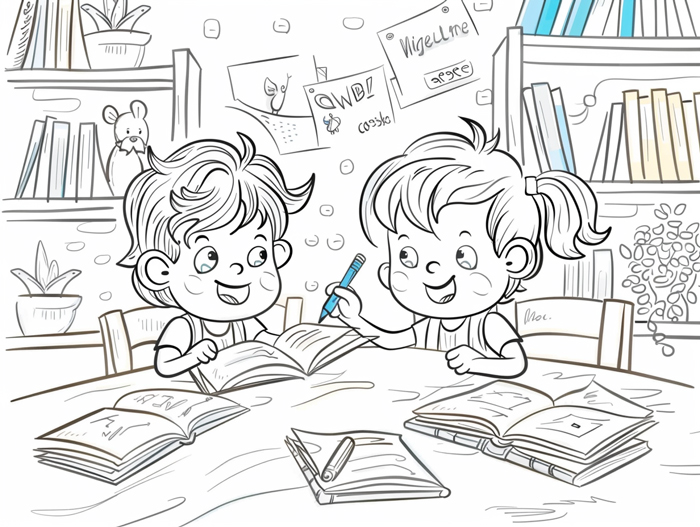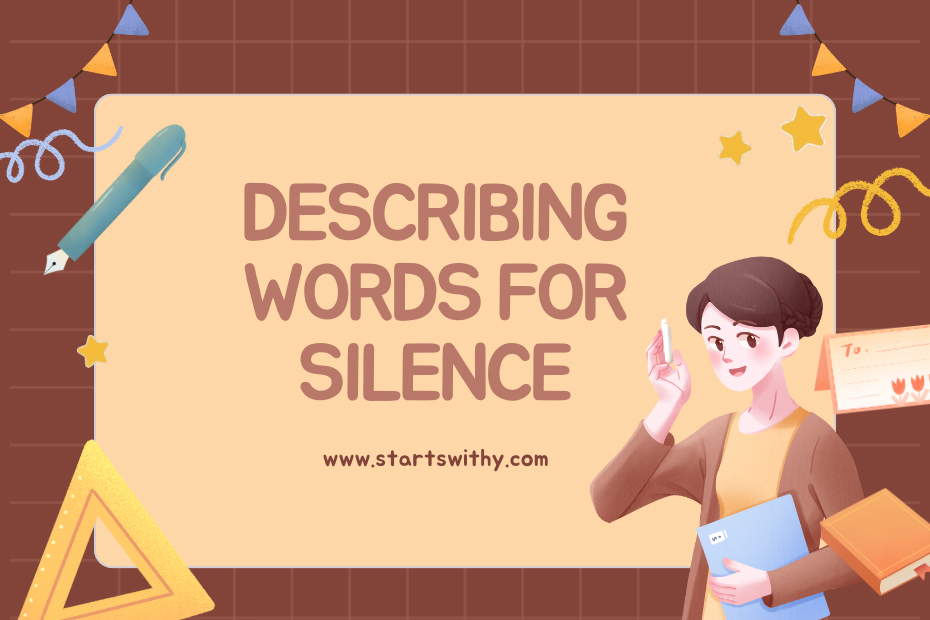Silence is a powerful force that can speak volumes without uttering a single word. As a writer, I’ve always been fascinated by the different ways we can describe silence and the emotions it evokes. In this article, I’ll be exploring a variety of adjectives that can be used to paint a vivid picture of silence, along with examples to illustrate their usage.
From the tranquil hush of a peaceful morning to the deafening stillness of an abandoned room, silence can take on many forms. It can be eerie and unsettling, or it can be comforting and serene. By using the right adjectives, we can bring the essence of silence to life on the page, allowing readers to experience its power firsthand.
So, whether you’re a writer looking to enhance your descriptions or simply someone who appreciates the beauty of silence, join me as we dive into the world of adjectives for silence. Together, we’ll uncover the perfect words to capture the essence of silence and create a truly immersive reading experience.
How to Describe silence? – Different Scenarios
Silence can be described in various ways, depending on the context and the emotions it evokes. Let’s explore some different scenarios and the adjectives we can use to vividly describe silence.

1. Peaceful Silence
- In a serene forest, the silence surrounds me like a warm embrace.
- The tranquil silence of a sleeping baby fills the room with calmness.
- As I stood on the mountaintop, the silence was pure and unbroken, giving me a sense of serenity.
2. Eerie Silence
- The abandoned house was cloaked in an eerie silence, sending chills down my spine.
- In the pitch-black night, the silence was deafening, intensifying the feeling of unease.
- The eerie silence of the graveyard made me feel as if I was being watched by unseen eyes.
3. Awkward Silence
- After my embarrassing blunder, an awkward silence hung in the air, making me wish for a hole to swallow me up.
- As I sat at the dinner table with my ex, the silence between us spoke volumes, highlighting the tension between us.
- In the classroom, the silence that followed my teacher’s question filled me with anxiety as I desperately searched for an answer.
4. Anticipatory Silence
- The anticipation filled the room, and for a moment, there was a tangible silence as everyone held their breaths.
- The silence before the performance was electric, creating a sense of excitement and expectation.
- As I waited for the results, the silence was deafening, amplifying my anticipation and nerves.
5. Reverent Silence
- As the choir sang, the silence in the church was profound, a tribute to the reverence of the moment.
- The silence at the museum allowed me to truly appreciate the beauty and intricacy of the artwork.
- In the presence of nature’s majesty, the silence in the grand canyon was awe-inspiring, reminding me of my smallness in the world.
Describing silence in different scenarios can add depth and emotion to your writing. By carefully choosing the right adjectives, you can create a more immersive reading experience, allowing your readers to fully visualize and feel the silence in their minds.
Remember, silence is a powerful tool that can convey a multitude of emotions. Experiment with different adjectives and observe the impact they have on the reader.
Describing Words for silence in English

Silence can be a powerful tool in storytelling and description. Choosing the right adjectives to express silence can create a more immersive reading experience. In this section, I’ll explore a variety of adjectives that can effectively describe silence in different scenarios. Let’s take a closer look:
Peaceful Silence
- Tranquil
- Serene
- Calm
- Still
- Quiet
- Hushed
- Muted
In peaceful settings, these adjectives evoke a sense of tranquility and calmness, allowing the reader to imagine themselves in a serene environment.
Eerie Silence
- Haunting
- Spooky
- Uncanny
- Creepy
- Chilling
- Oppressive
When describing eerie silence, these adjectives create a sense of unease and foreboding, setting the stage for a suspenseful or mysterious atmosphere.
Awkward Silence
- Uncomfortable
- Tense
- Embarrassing
- Stifling
- Constricting
In social situations, these adjectives reflect the discomfort and tension that can arise during moments of awkward silence, making the reader empathize with the characters involved.
Anticipatory Silence
- Taut
- Suspenseful
- Expectant
- Nervous
- Charged
These adjectives describe the silence that builds up before something significant happens, creating a sense of anticipation and heightening the reader’s curiosity.
- Sacred
- Holy
- Reverential
- Respectful
- Devotional
When depicting solemn or sacred moments, these adjectives convey a deep sense of reverence and respect, emphasizing the importance of the silence in the scene.
Remember, choosing the right adjectives is crucial for creating an engaging and immersive reading experience. By carefully selecting descriptive words, we can bring silence to life on the page and captivate our readers. In the next section, we’ll explore more examples and scenarios where adjectives for silence can be effectively utilized.
Adjectives for silence

Positive Adjectives for silence with 12 Example Sentences
When it comes to describing silence, there are several positive adjectives that can vividly depict the quietness and serenity of a situation. Here are some examples of positive adjectives for silence:
| Adjective | Example Sentence |
|---|---|
| Peaceful | The calm lake was enveloped in peaceful silence. |
| Tranquil | The forest was filled with tranquil silence. |
| Serene | The garden was bathed in serene silence. |
| Harmonious | The choir’s voices faded into harmonious silence. |
| Calm | The ocean waves lulled me into a calm silence. |
| Soothing | The soft lullaby put the baby into a soothing silence. |
| Restful | The hammock swayed gently, creating a restful silence. |
| Meditative | The monk sat in quiet contemplation, enjoying the meditative silence. |
| Tranquility | As I closed my eyes, a sense of tranquility surrounded me in silence. |
| Hushed | The gallery was filled with a hushed silence as visitors admired the artwork. |
| Placid | The lake’s placid surface mirrored the peaceful silence around it. |
| Still | The night was still, its silence broken only by the rustle of leaves. |
Negative Adjectives for silence with 5 Example Sentences
While silence can often be comforting, there are times when it can also feel uncomfortable or unsettling. Here are some negative adjectives that can describe silence in those situations:
| Adjective | Example Sentence |
|---|---|
| Awkward | The silence between them grew awkward and tense. |
| Oppressive | The heavy silence in the room was oppressive. |
| Uncomfortable | The awkward silence made everyone feel uncomfortable. |
| Eerie | The eerie silence of the abandoned house sent shivers down my spine. |
| Tense | The tense silence hung in the air, filled with anticipation. |
Choosing the right adjectives for silence can greatly enhance the reading experience and create a more immersive environment for the readers. Whether it’s conveying peacefulness or unease, selecting the appropriate adjectives helps paint a vivid picture in the reader’s mind. By understanding the nuances of silence and utilizing the right adjectives, we can effectively captivate our readers and bring our writing to life.
Synonyms and Antonyms with Example Sentences

Synonyms for silence
When it comes to describing silence, there are several synonyms that can be used to vividly depict this concept. Here are some examples:
- Quietness – The quietness of the room was unnerving.
- Stillness – I could hear nothing but the stillness of the night.
- Hush – The hush that fell over the crowd was deafening.
- Serenity – The serenity of the empty beach was soothing.
- Peace – The moment was filled with a sense of peace and tranquility.
Antonyms for silence
On the other hand, if you want to convey the opposite of silence, there are antonyms that can be used to add contrast to your writing. Consider these examples:
- Noise – The noise of the city drowned out any chance of silence.
- Commotion – The commotion in the classroom made it impossible to concentrate.
- Chatter – The chatter of the birds filled the air with life.
- Racket – The racket from the construction site was unbearable.
- Bustle – The bustle of the busy street never ceased.
By using these synonyms and antonyms for silence, you can add depth and nuance to your descriptions. Remember to choose the right word depending on the context and the atmosphere you want to create.
| Synonym | Example Sentence |
|---|---|
| Quietness | The quietness of the library allowed me to focus on my reading. |
| Stillness | In the stillness of the forest, I could hear the rustling of leaves under my feet. |
| Hush | The baby fell asleep to the gentle hush of his mother’s voice. |
| Serenity | Walking by the lake brought me a sense of serenity and peace. |
| Peace | The professor’s calming voice created an atmosphere of peace during the lecture. |
| Antonym | Example Sentence |
|---|---|
| Noise | The loud noise from the construction site disrupted my concentration. |
| Commotion | The children’s commotion in the classroom made it difficult to teach. |
| Chatter | The pleasant chatter of the coffee shop added to the cozy ambiance. |
| Racket | The neighbor’s party created a constant racket late into the night. |
| Bustle | The bustle of the market delighted my senses with its vibrant energy. |
Conclusion
Describing silence can be a powerful tool in writing, allowing us to create vivid and immersive experiences for our readers. Throughout this article, we have explored the impact that different adjectives can have on our descriptions of silence.
By carefully selecting positive and negative adjectives, we can add depth and nuance to our writing. Whether we choose to use words like “serene” and “tranquil” to evoke a sense of peace, or words like “oppressive” and “deafening” to convey a feeling of tension, the right adjectives can bring our descriptions to life.
Understanding the nuances of silence and utilizing the appropriate adjectives can captivate readers and transport them into the world we have created. It allows us to paint a more vivid picture, engaging their senses and emotions.
So, the next time you find yourself trying to describe silence, remember the power of adjectives. Choose them wisely, and watch as your writing comes alive, leaving a lasting impact on your readers.



